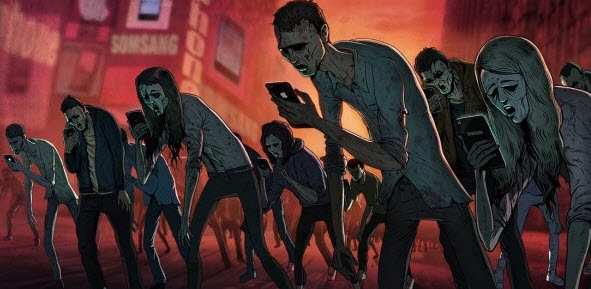
 Disconnect To Reconnect
Disconnect To Reconnect
In the UK, 88% of people think that loneliness is a problem, and although it might seem hard to define, it is as damaging to health as smoking and obesity. Clearly, feeling lonely can be caused by many different things happening at the same time, such as where you live, your job, relationships or a disability.
There is something that I think – and this is not just my opinion – has a bigger impact than all the other factors: technology, or more specifically, social media. People invest more energy in their online presence than they do in actual human relationships: how often have you met up with a friend and sat silently on your phones? If you haven’t done this you have at least seen it happen.
On public transport too, you sit or stand staring at your screen, plugged into earphones with the volume turned up to drown out everything else. In a country where it seems nobody talks to each other anymore it is perhaps no wonder that almost a fifth of the population often – or worse, always – feel lonely.
Other technology also adds to this widespread sense of isolation. The common thing to do upon returning home from work is to switch on the TV. This can block out any conversation you might have with your housemates or family, and if you live alone, it could even isolate you from yourself. Having time to reflect on your thoughts and listen to how you are feeling is very important, and always having stimuli flooding your brain prevents you from doing so.
Whilst social media have the potential to help you connect with people, they so often do the opposite. In fact, the excessive use of screens is causing a decline in children’s ability to read body language and facial expressions, and there is no reason to think this doesn’t also apply to adults, who appear to feel lonelier the more they use social media.
But what can be done about this? Technology can be a wonderful thing, and social media definitely help you keep in touch, organise things and connect with people, but at the same time they aren’t perfect, and care should be taken to avoid the dangers, such as loneliness.
I always think of phones and screens in general as a layer that gets in between you and reality. This for me explains why technology can make people feel isolated, because it creates a barrier to proper interaction with real people in the real world (not their ‘data selves’ in cyberspace). The solution in this way of understanding is actually pretty simple. Remove the layer.
When you meet up with people, leave your phone in your deepest pocket and be careful not to get it out as soon as there is a silence: enjoy the silence. When travelling or waiting, instead of scrolling on your phone, pass the time by people-watching (this will help you practise your people-reading skills) or even strike up a conversation.
I know myself how scary this last option can be, and also how many times you will probably get nothing more than a weird look or an uninterested, one-word reply. But you never know, you could end up interacting with another human being.
Another thing you can do, which I did and found very useful, is unfollow as many people and pages as you can on whatever platforms you use. I went pretty extreme and unfollowed everything and everyone on Facebook, so that every time I automatically went to my feed, I was told there were no posts to show, and I’d have to go and do something more worthwhile, or actually find out what people are up to from themselves.
It seems counterintuitive, but decreasing the amount you engage with social media, as long as you are making efforts to connect in real life, can help get rid of the feelings of isolation and loneliness felt by so many. Then again, maybe I’m just an antisocial luddite with no understanding of how the world works!
